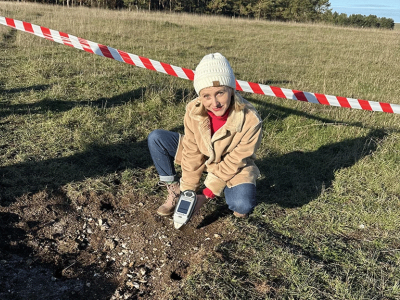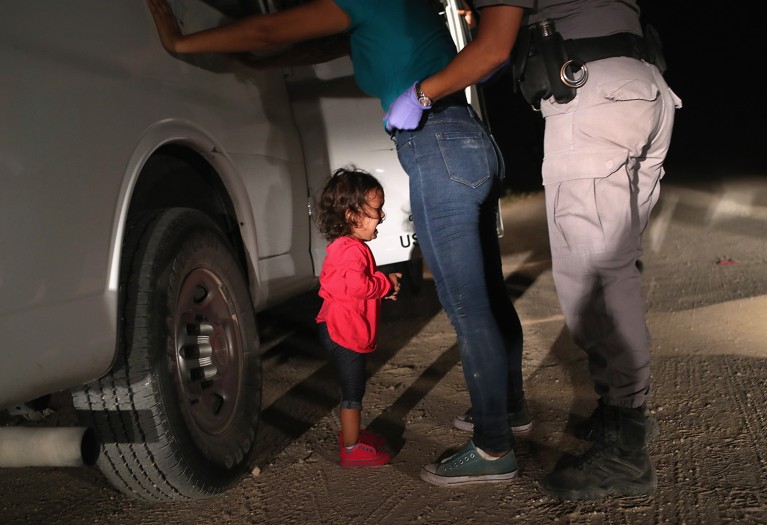Conflicts in Ukraine, Gaza, Sudan, Syria and elsewhere have exacerbated a global missing-persons crisis. There is an urgent need for an international DNA database designed specifically to aid the reunification of living family members. Such a database would help to lessen the trauma of those who have been separated. It would also help to provide evidence of human-rights violations.
Since Russia’s invasion of Ukraine almost three years ago, nearly 20,000 Ukrainian children have been taken to Russia. In December, investigators at the Yale School of Public Health Humanitarian Research Lab in New Haven, Connecticut, discovered that 314 of these children, from the Donetsk and Luhansk provinces, had been placed in a “systematic program of coerced adoption and fostering” in Russia1. Because Russia gives adoptive parents the legal right to change a child’s name and official date and place of birth, the children’s Ukrainian identities could have been erased. A similar fate might have befallen many of the others. A DNA database of Ukrainian families who have lost children is crucial to help these families reconnect — now and in the future. Years or decades from now, these children might learn of their Ukrainian heritage and want to find their living relatives.
Urgent need
As a geneticist and ethicist, I am familiar with the risks that come with DNA testing. Governments can use DNA databases for state-level surveillance. Furthermore, the use of DNA can exacerbate injustices in the criminal-justice system, and families can be upended by revelations about paternity or maternity2. Since 2009, I have argued in several amicus briefs — legal documents that offer expertise to a court of law — that DNA should not be collected from people who have not been convicted of crimes. I have also argued against governments being the organizations to do the DNA testing for family reunifications (see go.nature.com/3dqrmzp).

I fled the war in Ukraine. Now I work on ways to help the country’s soil heal
In 2021, I, along with 19 co-authors, also proposed how DNA testing could be used securely and ethically to help reconnect family members who had been separated by the 2017–18 US Zero Tolerance immigration policy3. Under this policy, everyone who crossed the US–Mexico border without documentation faced criminal charges, which led to children and infants being separated from their guardians or parents. By then I was convinced of the importance of a DNA database as a front-line tool in humanitarian contexts for living, separated family members. So much so, that in 2022, I co-founded DNA Bridge, a non-profit organization to advance the secure and ethical use of DNA testing to assist family reunifications in humanitarian settings.
What has happened in Ukraine is not the first example of children being taken from their families during conflict, and it won’t be the last. ‘Child-taking’ has long been a tool of war and genocide, including in the Second World War4. In the 1970s and 1980s, for various reasons, children were forcibly taken from Chile, Argentina, Guatemala and El Salvador and placed with other families, either in the same country or elsewhere. In these cases, DNA testing has helped some family members to reconnect — but only decades later.
Rather than waiting years, now is the time to develop a DNA kinship resource to aid Ukrainian families and communities seeking missing children. According to the December 2024 Yale report, many of the Ukrainian children who have been adopted in Russia are very young. Some were only two years old when they were removed in 2022. Also, many Ukrainian children born after the first Russian occupation in 2014 might not have paper documents, such as birth certificates and passports, that they could use to retrace their roots. DNA testing might be the only way to reconnect them with their families.

A woman is searched and detained near the US–Mexico border under the 2017–18 US Zero Tolerance immigration policy, which led to the separation of children and their parentsCredit: John Moore/Getty
With the help of local clinics, hospitals and humanitarian organizations, DNA data could be collected now from Ukrainian families that are missing children and could be securely stored in de-identified intergovernmental databases. These data could be matched with DNA data from separated children should the children become accessible — if, say, there is a regime change in Russia — whether that is months, years or decades from now.
The need is urgent because parents, grandparents and siblings could become unreachable in the refugee diaspora if they flee occupied territories or — if international support for Ukraine is reduced or withdrawn — are absorbed into Russia.
In 2023, the International Criminal Court (ICC) issued arrest warrants for Russian President Vladimir Putin and Russia’s commissioner for children’s rights, Maria Alekseyevna Lvova-Belova, on charges of war crimes connected to the unlawful removal of Ukrainian children to Russia. But communication between international authorities and the Ukrainian families with missing children has proved difficult for reasons that are still being investigated. Part of the problem might be that there is limited infrastructure for reporting missing persons who have crossed a border. Some families have made their reports to the ICC anonymously, presumably because they are afraid of being persecuted as traitors, either by Ukraine or by Russia, or are afraid of putting their children in even greater danger by reporting them as missing5.






